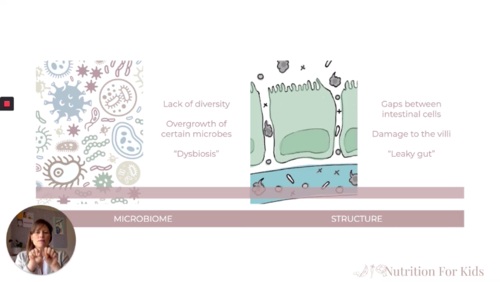Symptoms of leaky gut in kids
Could leaky gut be to blame for your child's tummy pain, food allergies and weak immune system?
"Leaky gut" has become a hot topic when talking about gut health as it can be associated with a number of health complaints in both adults and children.
What is leaky gut?
Leaky gut, also known as increased intestinal permeability, refers to damage of the digestive tract lining.
The intestinal wall is made of a single layer of cells held together with tight junctions. Attached to the cells are finger-like projections known as villi which help with nutrient absorption.
When there is leaky gut syndrome, the lining becomes damaged and gaps between the cells occur. You can think of the gut lining like a sieve. When there is increased intestinal permeability, the holes of the sieve become greater.
This allows undigested food particles, toxins such as pesticides, medication, chemicals, and gut bacteria to leak through the gut lining and enter the bloodstream. The body doesn't recognise these particles and considers them to be foreign invaders. As a result, it mounts an immune system response creating antibodies and inflammation.
Damage can also occur to the finger-like villi causing them to flatten. This can impede the body's ability to absorb nutrients.
Does my child have a leaky gut?
Leaky gut has been associated with a variety of health issues in children. Food intolerances, food allergies, asthma, behaviour conditions like autism and ADHD, eczema, autoimmune disease like celiac disease, inflammatory bowel disease, irritable bowel syndrome have all been linked in some way to leaky gut.
What we don't know is whether these health issues are caused by leaky gut and the disordered immune response, or causing the increased intestinal permeability. It's a bit like the chicken and egg scenario!
DISCOVER the state of your child’s gut health
Take the Kids Gut Health Check-up quiz today to see how you can best support your child's health by healing and nourishing the gut.
Take the Kids Gut Health Quiz now.
A baby is born with a very immature digestive system and the gut microbiome at this age is very fragile. It's vulnerable to disruptions that can wreak havoc on the gut leading to leaky gut and microbiome imbalances.
As our children getting older, they are faced with more disruptions through the introduction of food, excess sugar, exposure to toxins, pesticide residues, stress, antibiotic use, pathogenic or "bad bacteria" strains - all of which can cause gut issues through the aggravation of the child's gut lining and imbalance of the microbiome, also known as dysbiosis.
Common signs and symptoms of leaky gut in children include:
Digestive system upset such as bloating, tummy pain, irregular bowel movements, constipation and diarrhoea;
Food intolerances, food sensitivities or food allergies;
Asthma;
A weakened immune system including recurrent colds and ear infections;
Skin conditions such as eczema, psoriasis, nappy rash, hives and acne;
Brain fog, headaches or poor cognitive function;
Anxiety and depression;
Behavioural issues like autism, ADHD and ADD;
Autoimmune diseases like coeliac disease, Crohn's disease and ulcerative colitis.
Unfortunately, there is no definitive test for leaky gut. There is also no one supplement, probiotic or diet change that can "solve" leaky gut.
However, there are ways you can heal your child's gut, repair the gut lining and restore the balance and health of the gut microbiome. Gut healing can be achieved once you have discovered what are the causing or contributing factors of your child's leaky gut. You want to get to the root of the problem rather than simply address the symptoms that present.
In an upcoming post, we'll discuss some of the leading causes of leaky gut syndrome in children and what we can do to encourage gut healing. Stay tuned!
Want to learn more about kids gut health?
The Kids Gut Health Webinar provides you with an introduction to the gut microbiome.
Over 49 minutes, nutritionist Sarah Appleford discusses what gut health actually means, the gut microbiome and what occurs in an unhealthy gut.
Watch the Kids Gut Health Webinar here.







